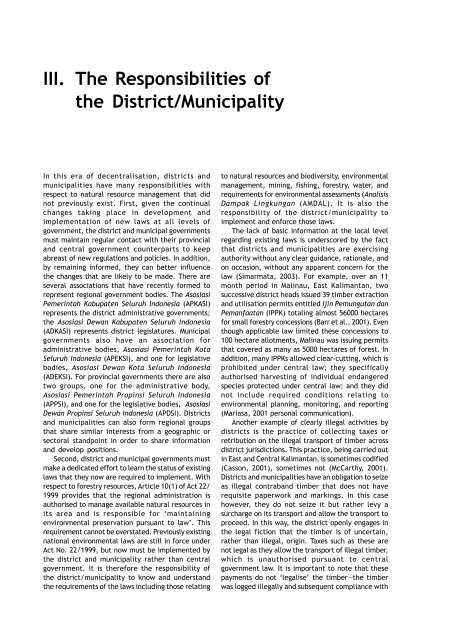A rough guide to developing laws for regional forest management
A rough guide to developing laws for regional forest management
A rough guide to developing laws for regional forest management
You also want an ePaper? Increase the reach of your titles
YUMPU automatically turns print PDFs into web optimized ePapers that Google loves.
III. The Responsibilities of<br />
the District/Municipality<br />
In this era of decentralisation, districts and<br />
municipalities have many responsibilities with<br />
respect <strong>to</strong> natural resource <strong>management</strong> that did<br />
not previously exist. First, given the continual<br />
changes taking place in development and<br />
implementation of new <strong>laws</strong> at all levels of<br />
government, the district and municipal governments<br />
must maintain regular contact with their provincial<br />
and central government counterparts <strong>to</strong> keep<br />
abreast of new regulations and policies. In addition,<br />
by remaining in<strong>for</strong>med, they can better influence<br />
the changes that are likely <strong>to</strong> be made. There are<br />
several associations that have recently <strong>for</strong>med <strong>to</strong><br />
represent <strong>regional</strong> government bodies. The Asosiasi<br />
Pemerintah Kabupaten Seluruh Indonesia (APKASI)<br />
represents the district administrative governments;<br />
the Asosiasi Dewan Kabupaten Seluruh Indonesia<br />
(ADKASI) represents district legislatures. Municipal<br />
governments also have an association <strong>for</strong><br />
administrative bodies, Asosiasi Pemerintah Kota<br />
Seluruh Indonesia (APEKSI), and one <strong>for</strong> legislative<br />
bodies, Asosiasi Dewan Kota Seluruh Indonesia<br />
(ADEKSI). For provincial governments there are also<br />
two groups, one <strong>for</strong> the administrative body,<br />
Asosiasi Pemerintah Propinsi Seluruh Indonesia<br />
(APPSI), and one <strong>for</strong> the legislative bodies, Asosiasi<br />
Dewan Propinsi Seluruh Indonesia (APDSI). Districts<br />
and municipalities can also <strong>for</strong>m <strong>regional</strong> groups<br />
that share similar interests from a geographic or<br />
sec<strong>to</strong>ral standpoint in order <strong>to</strong> share in<strong>for</strong>mation<br />
and develop positions.<br />
Second, district and municipal governments must<br />
make a dedicated ef<strong>for</strong>t <strong>to</strong> learn the status of existing<br />
<strong>laws</strong> that they now are required <strong>to</strong> implement. With<br />
respect <strong>to</strong> <strong>for</strong>estry resources, Article 10(1) of Act 22/<br />
1999 provides that the <strong>regional</strong> administration is<br />
authorised <strong>to</strong> manage available natural resources in<br />
its area and is responsible <strong>for</strong> ‘maintaining<br />
environmental preservation pursuant <strong>to</strong> law’. This<br />
requirement cannot be overstated. Previously existing<br />
national environmental <strong>laws</strong> are still in <strong>for</strong>ce under<br />
Act No. 22/1999, but now must be implemented by<br />
the district and municipality rather than central<br />
government. It is there<strong>for</strong>e the responsibility of<br />
the district/municipality <strong>to</strong> know and understand<br />
the requirements of the <strong>laws</strong> including those relating<br />
<strong>to</strong> natural resources and biodiversity, environmental<br />
<strong>management</strong>, mining, fishing, <strong>for</strong>estry, water, and<br />
requirements <strong>for</strong> environmental assessments (Analisis<br />
Dampak Lingkungan (AMDAL). It is also the<br />
responsibility of the district/municipality <strong>to</strong><br />
implement and en<strong>for</strong>ce those <strong>laws</strong>.<br />
The lack of basic in<strong>for</strong>mation at the local level<br />
regarding existing <strong>laws</strong> is underscored by the fact<br />
that districts and municipalities are exercising<br />
authority without any clear guidance, rationale, and<br />
on occasion, without any apparent concern <strong>for</strong> the<br />
law (Simarmata, 2003). For example, over an 11<br />
month period in Malinau, East Kalimantan, two<br />
successive district heads issued 39 timber extraction<br />
and utilisation permits entitled Ijin Pemungutan dan<br />
Pemanfaatan (IPPK) <strong>to</strong>taling almost 56000 hectares<br />
<strong>for</strong> small <strong>for</strong>estry concessions (Barr et al., 2001). Even<br />
though applicable law limited these concessions <strong>to</strong><br />
100 hectare allotments, Malinau was issuing permits<br />
that covered as many as 5000 hectares of <strong>for</strong>est. In<br />
addition, many IPPKs allowed clear-cutting, which is<br />
prohibited under central law; they specifically<br />
authorised harvesting of individual endangered<br />
species protected under central law; and they did<br />
not include required conditions relating <strong>to</strong><br />
environmental planning, moni<strong>to</strong>ring, and reporting<br />
(Mariasa, 2001 personal communication).<br />
Another example of clearly illegal activities by<br />
districts is the practice of collecting taxes or<br />
retribution on the illegal transport of timber across<br />
district jurisdictions. This practice, being carried out<br />
in East and Central Kalimantan, is sometimes codified<br />
(Casson, 2001), sometimes not (McCarthy, 2001).<br />
Districts and municipalities have an obligation <strong>to</strong> seize<br />
as illegal contraband timber that does not have<br />
requisite paperwork and markings. In this case<br />
however, they do not seize it but rather levy a<br />
surcharge on its transport and allow the transport <strong>to</strong><br />
proceed. In this way, the district openly engages in<br />
the legal fiction that the timber is of uncertain,<br />
rather than illegal, origin. Taxes such as these are<br />
not legal as they allow the transport of illegal timber,<br />
which is unauthorised pursuant <strong>to</strong> central<br />
government law. It is important <strong>to</strong> note that these<br />
payments do not ‘legalise’ the timber—the timber<br />
was logged illegally and subsequent compliance with

















